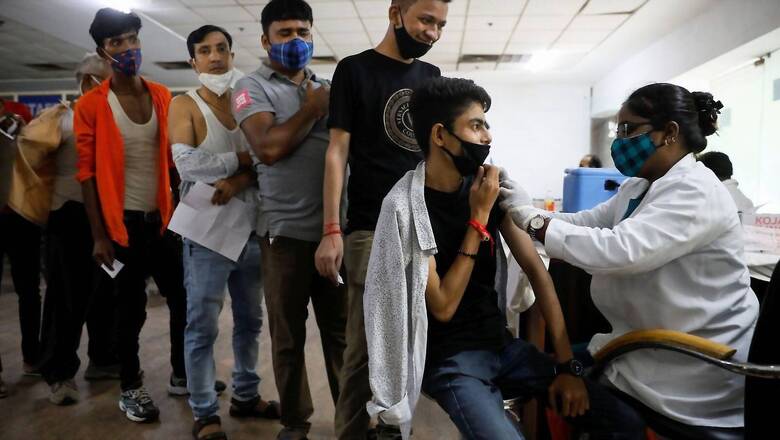
views
Is India finally at the cusp of the third wave of the coronavirus pandemic? If Thursday’s figures are anything to go by, the country may be headed for yet another surge. India’s daily Covid numbers jumped by 12 per cent as India reported 47,092 new infections, the biggest single-day rise in two months. About 509 deaths were recorded during the past 24 hours, according to the Health Ministry. Repeat offender Kerala contributed 32,803 cases in 24 hours to take the total number of those affected in the state by the viral infection to 40,90,036.
Does this mean India may soon have a new wave to deal with? As schools reopen, experts caution against rising cases and the impact the new surge may have on children who are expected to be hit the worst. News18 takes a look at what’s happening around the country amid worries of a third wave and if India is equipped to deal with the horrors it may bring.
When is the wave really coming?
India is gearing up to firm up its healthcare facilities, especially for children, and ramp up vaccination efforts. The country has not forgotten the death and destruction during the second wave in April and May when cases skyrocketed, deaths shocked and a creaking medical infrastructure remained overburdened.
Some experts say it will happen in October, predicting a peak in November. But that also depends on whether a more virulent strain of the virus emerges.
The Delta variant, discovered to be deadlier and more infectious than most other strains of the coronavirus, drove virus cases in the country during the second wave. Even as cases in India have dipped, other nations – Israel, the US – are struggling to combat the spread of the Delta.
Thus, experts say that a more infectious mutant of the virus could drive home a third wave of the virus. Manindra Agrawal, an IIT-Kanpur scientist who is part of the three-member team of experts that have been tasked with predicting any surge in infections, said India may see a third wave of COVID-19 peaking between October and November if a more virulent mutant than the existing ones emerge by September, but its intensity is expected to be much lower than the second wave. He added that if no new virulent emerges, then the situation is unlikely to change.
What’s up with Kerala?
The alarming surge in Covid-19 cases in Kerala has led health experts to link the increase with possible beginning of the third wave of the pandemic in India, according to reports.
While the Centre and the State government has not officially termed the surge in Kerala to the third wave, a staggering 72 per cent of total cases of Covid-19 cases in the country were reported in Kerala this week.
“The surge indicates that it may be the beginning of the third wave and we need to be careful now,” public health expert and epidemiologist Dr Raman Kutty told the Times of India. “We have a large susceptible population and the government needs to come up with a long-term strategy to deal with new Covid waves,” she added.
Former state epidemiologist, Dr A Sukumaran, said “It is the general principle of any viral infection that there may be multiple waves when we have a susceptible population. Kerala will also see many Covid waves before the cases actually start subsiding.”
However, Kerala’s covid-19 surge is different from the nation’s average, Dr Rajeev Jayadevan, vice-chairman, research cell, IMA (Kerala state). “Unlike small nations, waves do not occur uniformly in a large country due to variation in factors such as travel, population density, socio-economic conditions, geography, weather, vaccination, literacy, sero-prevalence, regional penetration of misinformation, quality of science communication, healthcare infrastructure and compliance with safe pandemic behaviour,” he said.
Maharashtra not far behind
Maharashtra will be hit by the third wave of the coronavirus by the end of October or the first week of November as most festivities come to an end, and at least 60 lakh people will be infected by Covid-19, state Health Minister Rajesh Tope has said.
Maharashtra Medical Education Minister Amit Deshmukh appealed to people to celebrate upcoming festivals in a low-key manner. “A slight rise in COVID-19 cases is worrisome. People should strictly follow COVID-appropriate behaviour,” he told reporters.
Deshmukh said while experts have been issuing warnings of a third wave of the COVID-19 pandemic, some districts in Maharashtra have indicated a rise in the daily number of infections. He said the healthcare system should remain vigilant and measures should be taken to minimise the spread of the viral infection. State-run hospitals should submit their demands of additional staff if they need, which will be immediately addressed by the government. These hospitals should have a sufficient number of oxygen beds to tackle the situation of a sudden rise in demand, Deshmukh said.
The Brihanmumbai Municipal Corporation (BMC) said it was making all necessary preparations to keep the city’s health infrastructure ready, especially when it comes to bed and oxygen availability.
In an interview to Times of India, BMC additional municipal commissioner Suresh Kakani said the civic body will keep 30,000 beds ready for a possible third wave. He also added that oxygen refilling plants will also be set up in Chembur and Mahalaxmi, so that the city does not run out of the life-saving gas needed to keep Covid patients stable.
Not just kerala, Maharashtra
Mizoram and Andhra Pradesh too have reported moderate spurts in Covid cases. Weekly cases rose 44% as compared with the previous seven days in Mizoram. In the south, Andhra reported a spike of 13.2%.
Reopening of schools — a necessary evil?
Several states have observed a rise in Covid-19 cases among children, shortly after the reopening of schools. Amid the speculations and concerns of the third wave, schools were reopened in Punjab, Bihar, Madhya Pradesh, Gujarat, Chhattisgarh, Uttarakhand, Jharkhand and Chandigarh. Schools in Delhi also reopen from September 1, for classes 9-12. Coaching classes, colleges and universities have also been allowed to function.
Infection rates in Punjab have reportedly grown by 9.6 per cent between July and August. The schools in the state were reopened from August 2 whereas in Bihar, Madhya Pradesh, Gujarat, and Chhattisgarh, the Covid cases are growing at 2 and 3 per cent.
As experts warn about the third wave hitting children the hardest, many argue that loss of learning was too big a trade-off. Delhi Deputy Chief Minister and Education Minister Manish Sisodia, while speaking to CNN-News18, said authorities could not wait for a zero case day to throw open schools again. “We had to estimate the quantum of loss borne by the students due to schools being shut on the account of Corona and definitely, there has been a huge loss. One entire generation has been left behind. We have to make up that loss, we have to move forward. In any case, our country is backward when it comes to the education of children.”
The Maharashtra COVID-19 task force on children on Tuesday stressed undertaking vaccination of teachers and non-teaching staff on priority before taking any decision on reopening schools for physical classes. The paediatrician task force was formed by the state government in May to prevent children from contracting COVID-19 amid fears of a possible third wave of the pandemic.
Vaccine for kids — developments so far
The Drugs Controller General of India (DCGI) on Wednesday granted permission to Hyderabad-based Biological E Limited to conduct phase 2/3 clinical trials of its ‘Made in India’ COVID-19 vaccine on children aged between 5 and 18 years with certain conditions.
So far, indigenously developed Zydus Cadila’s needle-free COVID-19 vaccine ZyCoV-D has received Emergency Use Authorisation from the drug regulator, making it the first vaccine to be administered in the age group of 12-18 years in the country. Meanwhile, the data of phase 2/3 clinical trials of Bharat Biotech’s Covaxin in the age group 2 to 18 years is underway.
India’s drug regulator in July granted permission to Serum Institute of India (SII) for conducting phase 2/3 trials of Covovax on children aged 2 to 17 years with certain conditions. Biological E’s anti-coronavirus shot, Corbevax, which is a RBD protein sub-unit vaccine is currently undergoing phase 2/3 clinical trials on adults, sources had said earlier.
Read all the Latest News, Breaking News and Assembly Elections Live Updates here.




















Comments
0 comment